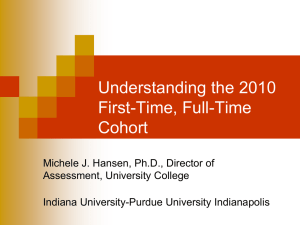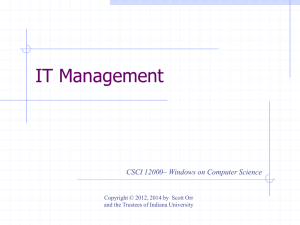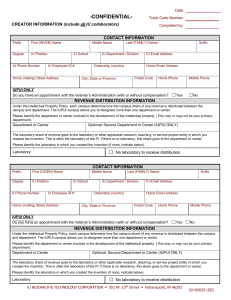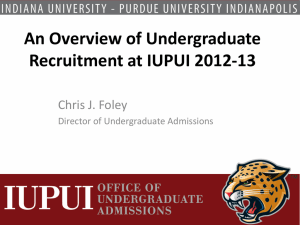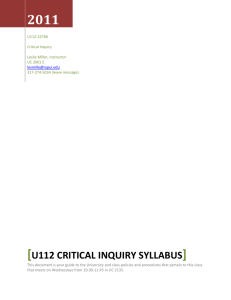Proposal - IUPUI Registrar - Indiana University–Purdue University
advertisement
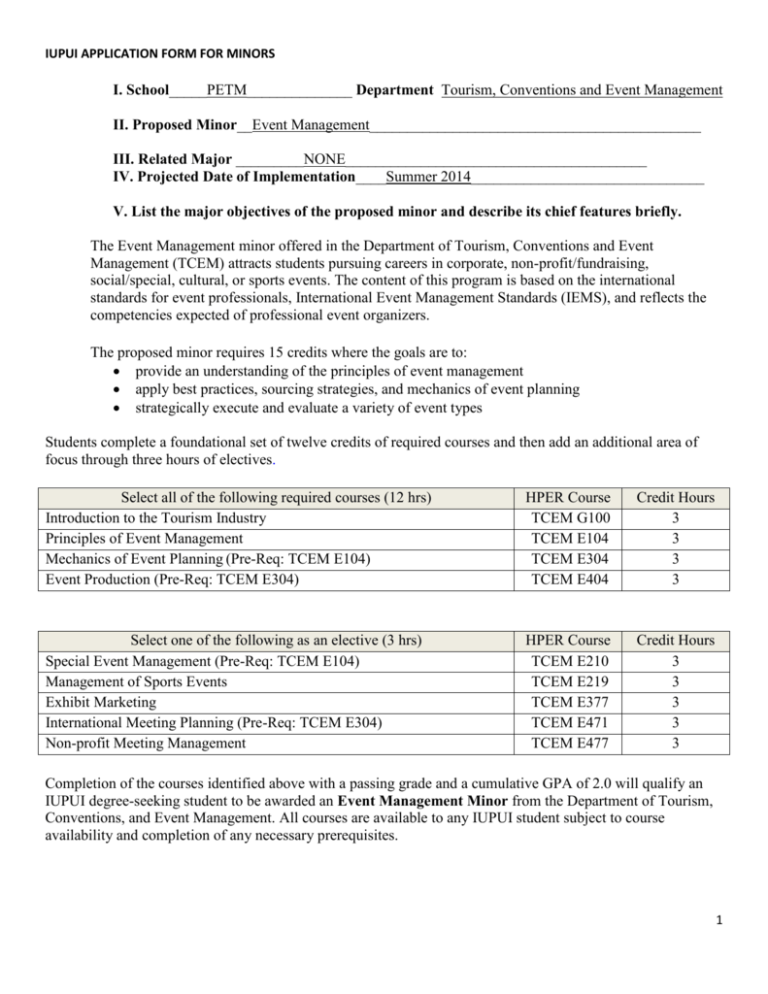
IUPUI APPLICATION FORM FOR MINORS I. School_____PETM______________ Department Tourism, Conventions and Event Management II. Proposed Minor__Event Management____________________________________________ III. Related Major _________NONE________________________________________ IV. Projected Date of Implementation____Summer 2014_______________________________ V. List the major objectives of the proposed minor and describe its chief features briefly. The Event Management minor offered in the Department of Tourism, Conventions and Event Management (TCEM) attracts students pursuing careers in corporate, non-profit/fundraising, social/special, cultural, or sports events. The content of this program is based on the international standards for event professionals, International Event Management Standards (IEMS), and reflects the competencies expected of professional event organizers. The proposed minor requires 15 credits where the goals are to: provide an understanding of the principles of event management apply best practices, sourcing strategies, and mechanics of event planning strategically execute and evaluate a variety of event types Students complete a foundational set of twelve credits of required courses and then add an additional area of focus through three hours of electives. Select all of the following required courses (12 hrs) Introduction to the Tourism Industry Principles of Event Management Mechanics of Event Planning (Pre-Req: TCEM E104) Event Production (Pre-Req: TCEM E304) HPER Course TCEM G100 TCEM E104 TCEM E304 TCEM E404 Credit Hours 3 3 3 3 Select one of the following as an elective (3 hrs) Special Event Management (Pre-Req: TCEM E104) Management of Sports Events Exhibit Marketing International Meeting Planning (Pre-Req: TCEM E304) Non-profit Meeting Management HPER Course TCEM E210 TCEM E219 TCEM E377 TCEM E471 TCEM E477 Credit Hours 3 3 3 3 3 Completion of the courses identified above with a passing grade and a cumulative GPA of 2.0 will qualify an IUPUI degree-seeking student to be awarded an Event Management Minor from the Department of Tourism, Conventions, and Event Management. All courses are available to any IUPUI student subject to course availability and completion of any necessary prerequisites. 1 IUPUI APPLICATION FORM FOR MINORS VI. Why is the minor needed? (Rationale) Event management is increasingly becoming recognized globally as a distinct occupation and profession. There is an associated set of standards advocated and promoted by professional associations and large event companies that are becoming sophisticated and designed to ensure that returns on investment accrue to those organizing meetings and other planned events. Moreover, several organizations have mapped the competencies required to be effective as an event manager and offer education and training programs to develop this unique skills base. Educators have also experienced an explosion of interest from potential students who are keen to gain skills to enter the event management profession. There has been a corresponding expansion of events courses as well as the development of a community of scholars who define themselves wholly or partly in relation to their teaching and/or research on planned events. Many collegiate event curricula focuses on the following tasks, outline by O*Net (http://www.onetonline.org/link/summary/13-1121.00). Monitor event activities to ensure compliance with applicable regulations and laws, satisfaction of participants, and resolution of any problems that arise. Confer with staff at a chosen event site to coordinate details. Inspect event facilities to ensure that they conform to customer requirements. Coordinate services for events, such as accommodation and transportation for participants, facilities, catering, signage, displays, special needs requirements, printing and event security. Consult with customers to determine objectives and requirements for events such as meetings, conferences, and conventions. Meet with sponsors and organizing committees to plan scope and format of events, to establish and monitor budgets, or to review administrative procedures and event progress. Review event bills for accuracy, and approve payment. Evaluate and select providers of services according to customer requirements. Arrange the availability of audio-visual equipment, transportation, displays, and other event needs. Plan and develop programs, agendas, budgets, and services according to customer requirements. A letter of support from the Kelley School of Business appears below along with a letter from the Department of Technology, Leadership and Communication of the School of Engineering and Technology. VII. Describe the student population to be served and market to be targeted. This minor will target all students interested in event management regardless of the academic major. The TCEM Department has received interest and inquiry in this minor from other schools and departments, such as the Kelley School of Business, the School of Journalism, the Lilly Family School of Philanthropy, Community Learning Network (General Studies), and the Department of Technology, Leadership and Communication. Additionally, students from the Department of Kinesiology within the 2 IUPUI APPLICATION FORM FOR MINORS School of Physical Education and Tourism Management will be able to add this minor. Students pursuing the B.S. in Tourism, Conventions, and Event Management will not be eligible for this minor. According to recent data from the Department of Labor the job outlook for Event Managers is excellent: “Employment of meeting, convention, and event planners is expected to grow 44 percent from 2010 to 2020, much faster than the average for all occupations. As globalization increases and businesses continue to recognize the value of professionally planned meetings, the need for meetings and events is expected to grow.” Adding this minor to a Bachelor’s degree in another field will expand students’ career options. Quick Facts: Meeting, Convention, and Event Planners 2010 Median Pay $45,260 per year $21.76 per hour Entry-Level Education Bachelor’s degree Work Experience in a Related Occupation Less than 1 year On-the-job Training None Number of Jobs, 2010 71,600 Job Outlook, 2010-20 44% (Much faster than average) Employment Change, 2010-20 31,300 http://www.bls.gov/ooh/Business-and-Financial/Meeting-convention-and-event-planners.htm 3 IUPUI APPLICATION FORM FOR MINORS VIII. How does this minor complement the departmental and campus missions? Address how it conforms with IUPUI’s Principles of Undergraduate Learning. The IU School of Physical Education and Tourism Management capitalizes on its rich history and unique location in downtown Indianapolis to prepare future leaders in kinesiology and tourism by translating theory into practice. In addition, the Department of TCEM’s mission is to be Indiana’s leading research and academic center specializing in event, sport and cultural tourism. Through research, teaching and civic engagement, the mission of the TCEM department is to advance intellectual growth and economic development on a local, national and international level. This parallels IUPUI’s mission. This minor will complement the department, school, and campus missions by offering students the opportunity to acquire the competencies that will encourage them to master the knowledge and skills necessary for event management and promote the best practices of the event management profession. All students receiving a Minor in Event Management will be expected to acquire the following skills and/or knowledge on the following IUPUI Principles of Undergraduate Learning: PUL1 Core Communication and Quantitative Skills: 1A: Express ideas effectively in variety of formats, written, oral and visual. 1E: Make use of information resources and technology as related to event management PUL 2 Critical Thinking: Solve problems, make decisions, identify risks and demonstrate professional competence as related to event management Use and analyze data as related to coaching strategy, assessment, and pedagogy. PUL 3 Integration and Application of Knowledge: Use information and knowledge to develop strategic plans for events. Participation in project based learning PUL 4 Intellectual Depth, Breadth, and Adaptiveness Demonstrate substantial knowledge and understanding in the area of event management. Demonstrate the ability to compare and contrast different learning styles Demonstrate the ability to modify the event based on the audience and event purpose. PUL 5 Understanding Society and Culture Compare and contrast the role of diversity and culture PUL 6 Values and Ethics Understand how values and ethics play a role in creating and executing events. Make informed decisions based using sound ethical considerations For more on the PULs, see below. 4 IUPUI APPLICATION FORM FOR MINORS RISE to the IUPUI Challenge The event management minor supports the IUPUI RISE initiative by incorporating experimental learning in many of the courses offered for the minor. For more on RISE see below. IX. List and indicate the sources (including reallocation) of any resources (personnel, financial, learning, library holdings, equipment, etc.) required to implement the proposed program. No new resources are needed since all the courses are currently in the catalog and are regularly offered. We don’t foresee the need to purchase any additional material to support this minor. The library already has sufficient resources related to event management. X. Describe any innovative features of the program (e.g., involvement with local or regional agencies, offices, etc., cooperative efforts with other institutions, etc.) This minor will provide the students with the opportunity to explore the event management career through local and state organizations and gain invaluable insight from our community/industry partners. Students will also be able to explore internship opportunities through a variety of non-profit and for-profit event organizations throughout Central Indiana. XI. List the major student outcomes (or set of performance-based standards) for the proposed minor. That is, what learning will the program produce in a comprehensive sense? (See Attachment following XII for a model that incorporates illustrations of the outcomes and assessment mechanisms specified in Items XI and XII.). Course selections in the event management minor cover twelve domains of expertise recommended in the International Event Management Standards (IEMS) created in partnership with the Canadian Tourism Human Resource Council (http://cthrc.ca/). 1. Strategic planning 2. Project management 3. Risk management 4. Financial management 5. Administration 6. Human resources 7. Stakeholder management 8. Event design 9. Site management 10. Marketing 11. Professionalism 12. Communication The above IEMS domains are linked to specific student outcomes in the chart below. 5 IUPUI APPLICATION FORM FOR MINORS XII. Explain how each of the student learning outcomes identified in XI above will be assessed using, for example, course-embedded assessments, graduate follow-up, employer surveys, standardized tests, etc. Assessment Mechanism 1. Student in this minor will be assessed through the coursework. The coursework in the minor will cover the expertise domains listed above, which are recommended by the IEMS. 2. Student enrollment numbers will be carefully tracked through our recorder office and by the program director to monitor the growth of the minor. 3. In addition, the program director will monitor assessment data on an annual basis to ensure continuous improvement of the minor. The overall effectiveness of the event management minor will be assessed on a regular basis for the purpose of continuous improvement. The following mechanisms will be used to garner data related to overall effectiveness: Focus groups will be conducted on an annual basis with students scheduled to complete the minor. Through these sessions, qualitative data will be provided that will provide student perceptions of the effectiveness, connectedness, and usability of the minor Every three years, an alumni survey will be conducted to determine how the minor has impacted the career direction of students From a demand perspective, minor enrollment numbers will be examined and tracked. This will also ensure sufficient course availability. The minor will be examined as a component of the regular program review process The table below describes how the three desired learning outcomes for the event management minor will be assessed: 6 IUPUI APPLICATION FORM FOR MINORS Student Outcome: Where will students learn this knowledge or skill? PUL How will student achievement of Covered the outcome be assessed? 1. Provide an understanding of the principles of event management TCEM G100: Introduction to the Tourism Industry 1A, 1E Lecture by instructor, class discussion, presentations by industry experts, student writing assignments, and case study preparation and discussion In classroom: Quiz, exams, papers, and service critique 1A, 1E Lecture by instructor, class discussion, presentations by industry experts, student writing assignments, and case study preparation and discussion In classroom: Quiz, exams, papers, and case studies TCEM E304: Mechanics of Event Planning 3, 2, 4 Exams, case study, critiques, experiential learning/reflection TCEM E210: Special Event Management 3, 5 Exams, case study, critiques, experiential learning/reflection TCEM E219: Sport Event Management 3, 2, 4 Exams, case study, critiques, experiential learning/reflection, project, field experience TCEM E377: Exhibit Marketing 3, 2, 4 Exams, case study, critiques, experiential learning/reflection The assessment takes place in the course and in a culminating experience The assessment takes place in the course and in a culminating experience The assessment takes place in the course and in a culminating experience The assessment takes place in the course and in a culminating experience IEMS covered: Administration TCEM E104: Principles of Event Stakeholder Management management Communication 2. Apply best practices, sourcing strategies, and mechanics of event planning IEMS covered: Risk management Financial management Human resources Site management Marketing In what setting will the assessment take place? 7 IUPUI APPLICATION FORM FOR MINORS 3. Strategically execute and evaluate a variety of event types TCEM E404: Event Production 4,5,6 Creation, design and execution of an event – event capstone course TCEM E471: International Meeting Planning 4,5,6 Exams, case study, critiques, project TCEM E477: Non-Profit Meeting Management 4,5,6 Exams, case study, critiques, project IEMS covered: Strategic planning Project management Event design Professionalism The assessment takes place in the course and in the field The assessment takes place in the course. The assessment takes place in the course. 8 IUPUI APPLICATION FORM FOR MINORS List of Courses Descriptions for the Event Management Minor All courses are 3 credits and are currently taught. TCEM G100: Introduction to the Tourism Industry Introduces the various components of the tourism, events, and hospitality industry. Emphasis is placed on exploring such areas as service, food and beverage operations, lodging, hospitality, events and attractions. Students are exposed to different career opportunities available within the diverse scope of the industry. TCEM E104: Principles of Event Management Provides an introductory approach to planning and organizing events. Focus is on the operational principles of for-profit and non-profit event types, including sporting, cultural, social, and business. TCEM E304: Mechanics of Event Planning Analyzes elements and details relating to organization and execution of events. Students practice and apply principles to a number of topics including budgeting, site selection, marketing, staffing, risk management, design and evaluation. TCEM E404: Event Production Focuses on the creation, management and execution of events. Students will design an event concept and produce the event. TCEM E210: Special Event Management Explores in depth the planning for a myriad of social events such as themed parties, weddings, balls, fundraiser recognition and entertainment events. Experienitial learning via event volunteer work is a component of this course. TCEM E219: Management of Sports Events Surveys sport event planning on the amateur and professional levels. Discussions and studies entail site selection, logistics, personnel, marketing, economics, and legalities of hosting an event. TCEM E377: Exhibit Marketing Leads students through every phase of exhibit marketing, from the initial planning stage to implementation and post-show follow-up. TCEM E471: International Meeting Planning Explores the organization and production of international corporate business meetings, seminars, incentive trips and customer events using innovative and cost-effective programs that address changing business needs. TCEM E477: Non Profit Meeting Management Focuses on basic aspects and skills involved in planning and managing non-profit meetings and conventions. Examines sequences of events from the conceptual state of the first meeting plan through completion of the event. 9 IUPUI APPLICATION FORM FOR MINORS Course Number TCEM G100 TCEM E104 TCEM E304 TCEM E404 TCEM E210 TCEM E219 TCEM E377 TCEM E471 TCEM E477 Fall* Spring* Summer* * Course offerings are subject to change. Check the registrar’s course listing for updated course offerings and information. 10 IUPUI APPLICATION FORM FOR MINORS 11 IUPUI APPLICATION FORM FOR MINORS 12 IUPUI APPLICATION FORM FOR MINORS IUPUI Principles of Undergraduate Learning (PULs) The Principles of Undergraduate Learning are the essential ingredients of the undergraduate educational experience at Indiana University Purdue University Indianapolis. These principles form a conceptual framework for all students' general education but necessarily permeate the curriculum in the major field of study as well. More specific expectations for IUPUI's graduates are determined by the faculty in a student's major field of study. Together, these expectations speak to what graduates of IUPUI will know and what they will be able to do upon completion of their degree. I. Core Communication and Quantitative Skills [Definition:] The ability of students to express and interpret information, perform quantitative analysis, and use information resources and technology--the foundational skills necessary for all IUPUI students to succeed. [Outcomes:] Core communication and quantitative skills are demonstrated by the student’s ability to a. express ideas and facts to others effectively in a variety of formats, particularly written, oral, and visual formats; b. comprehend, interpret, and analyze ideas and facts; c. communicate effectively in a range of settings; d. identify and propose solutions for problems using quantitative tools and reasoning; e. make effective use of information resources and technology. II. Critical Thinking [Definition:] The ability of students to engage in a process of disciplined thinking that informs beliefs and actions. A student who demonstrates critical thinking applies the process of disciplined thinking by remaining open-minded, reconsidering previous beliefs and actions, and adjusting his or her thinking, beliefs and actions based on new information. [Outcomes:] The process of critical thinking begins with the ability of students to remember and understand, but it is truly realized when the student demonstrates the ability to a. apply, b. analyze, c. evaluate, and d. create knowledge, procedures, processes, or products to discern bias, challenge assumptions, identify consequences, arrive at reasoned conclusions, generate and explore new questions, solve challenging and complex problems, and make informed decisions. III. Integration and Application of Knowledge [Definition:] The ability of students to use information and concepts from studies in multiple disciplines in their intellectual, professional, and community lives. [Outcomes:] Integration and application of knowledge are demonstrated by the student’s ability to a. enhance their personal lives; b. meet professional standards and competencies; c. further the goals of society; and 13 IUPUI APPLICATION FORM FOR MINORS d. work across traditional course and disciplinary boundaries. IV. Intellectual Depth, Breadth, and Adaptiveness [Definition:] The ability of students to examine and organize disciplinary ways of knowing and to apply them to specific issues and problems. [Outcomes:] Intellectual depth, breadth, and adaptiveness are demonstrated by the student’s ability to a. show substantial knowledge and understanding of at least one field of study; b. compare and contrast approaches to knowledge in different disciplines; c. modify one's approach to an issue or problem based on the contexts and requirements of particular situations. V. Understanding Society and Culture [Definition:] The ability of students to recognize their own cultural traditions and to understand and appreciate the diversity of the human experience. [Outcomes:] Understanding society and culture is demonstrated by the student’s ability to a. compare and contrast the range of diversity and universality in human history, societies, and ways of life; b. analyze and understand the interconnectedness of global and local communities; and c. operate with civility in a complex world. VI. Values and Ethics [Definition:] The ability of students to make sound decisions with respect to individual conduct, citizenship, and aesthetics. [Outcomes:] A sense of values and ethics is demonstrated by the student’s ability to a. make informed and principled choices and to foresee consequences of these choices; b. explore, understand, and cultivate an appreciation for beauty and art; c. understand ethical principles within diverse cultural, social, environmental and personal settings. 14 IUPUI APPLICATION FORM FOR MINORS RISE to the IUPUI Challenge Initiative The RISE to the IUPUI Challenge initiative engages students more deeply in their learning and contributes to their intellectual and professional development in unique ways. Each undergraduate student is challenged to include at least two of the four RISE experiences - research, international, service learning, and experiential learning - into their degree programs. The RISE to the IUPUI Challenge initiative enhances the teaching and learning process that occurs during formal classroom coursework. The initiative builds on IUPUI's long tradition and commitment to experiential learning. Each RISE category incorporates qualified experiences, integration of knowledge, reflection, and assessment, and will be documented on students' transcripts. The IUPUI undergraduate educational experience is distinctive because it intentionally uses experiential learning to prepare students for graduate school, careers, and citizenship. It provides skills, knowledge, and experiences that are highly prized by employers and establishes the foundation for future leaders. RISE to the Challenge is focused on increasing undergraduate student participation in research, international, service and experiential learning programs. The RISE initiative will offer students special opportunities to engage in concrete experiences associated with research, global learning, community service, and careers. With guidance and mentorship, students will go on to relate these experiences to classroom learning in structured, educationally meaningful ways. RISE will engage students more deeply in their learning and contribute to their intellectual and professional development in unique ways. The initiative’s goal is for IUPUI graduates to have exposure to at least two RISE categories. Research conducted under the mentorship of a faculty member. Undergraduate research experiences include any scholarly or artistic activities that lead to the production of new knowledge; to increased problem solving capabilities, including design and analysis; to original critical or historical theory and interpretation; or to the production of art or artistic performance. The research requirement will not be met by courses that teach about research; rather, it is a credit-bearing educational experience that involves the student in conducting research under the mentorship of a faculty member. International experience, such as study-abroad courses or independent study. International engagement will include credit-bearing coursework or independent study in which students directly and intensively engage with a national community outside their own, reflect on this engagement in an informed and thoughtful way, and enhance their skills of international understanding and interaction. Study abroad (outside the 50 states and District of Columbia) is the preferred mode for fulfilling this goal, but exceptionally interactive and immersive experiences with immigrant groups, organizations concerned with global issues, or campus-based courses employing interactive distance technologies may sometimes also count. Students who are not U.S. citizens or permanent residents may apply to develop faculty-guided, credit-bearing formats for reflecting on their experiences in the U.S. Service-Learning Courses. A course-based, credit bearing educational experience in which a student participates in an organized service activity that meets identified community needs and reflects on the service 15 IUPUI APPLICATION FORM FOR MINORS activity in such a way as to gain further understanding of course content, a broader appreciation of the discipline, and an enhanced sense of personal values and civic responsibility. Experiential Learning Courses. Coursework specifically designed with increased requirements outside of the classroom can qualify as experiential learning (integration of knowledge, activity, reflection and assessment to translate learning into action). This requirement may be met with specially designated credit-bearing classes or by one of the following instruction formats: 1. Clinical Education 2. Cooperative Education 3. Field Work 4. Internship Practicum 5. Student Teaching 6. Mentoring Practice 7. Other categories Consistent with the other components of the RISE challenge, experiential learning courses will incorporate knowledge, activity, reflection, and assessment and carry academic credit discernable on the students’ transcript. For more on RISE, visit http://uc.iupui.edu/UndergraduateEducation/RISEtotheIUPUIChallenge.aspx. 16
